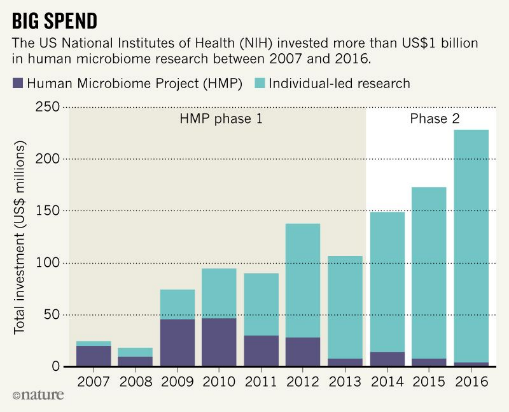
Source: Proctor1
In the past ten years microbiome research has consumed more than $1.7B (USD). More than $1B has come from the United States during two phases of the Human Microbiome Project. Findings from the Human Microbiome Project Phase 2 were recently published in Nature. The research outcome has demonstrated the importance of the microbiome in human health from birth and throughout life.
Fundamental Questions Remain Unanswered
While Proctor appreciates the immense volume of research completed, she believes there was too much emphasis on cataloging species names and taxonomy. "We've been characterizing the human microbiome as if it were a relatively fixed property to be mapped and manipulated," she states. "I think that interventions that could help to treat conditions such as diabetes, cancer and autoimmune disease will be discovered only if we move beyond species catalogues and begin to understand the complex and mutable ecological and evolutionary relationships that microbes have with each other and with their hosts."Proctor points out even with the tremendous amount of discovery from the past decade, many fundamental questions about the human microbiome remain unanswered: What constitutes a normal microbiome, and therefore an impaired or imbalanced one? How does the microbiome differ in different body parts?
Some investigators view and study the microbiome as an organ, yet one of the primary properties of the microbiome is its mutability. The microbiome changes over a lifetime, whereas organs remain largely unchanged. It makes more rapid changes in response to external influences in response to disease. Given this, Proctor "think[s] that the most effective route to discovering microbiome-based remedies will be to establish which microorganisms — and which assemblages of them — play a major part in dictating local conditions, or in affecting important cellular processes".
Supporting the Future of Microbiome Research
Proctor explores two areas that she believes are integral to success in gaining critical insights into the human microbiome:Data Standards
Data is not analyzed and presented in a standard way, which makes it difficult to reproduce and compare studies. The Genome Standards Consortium has developed standards for reporting metagenomics data and the Data Coordination Center of the HMP has adopted these standards. To move forward, journals and funding agencies must uphold these standards when reporting data, both in databases and publications.Coordination and Collaboration
As an example of coordination efforts, Proctor notes that twenty-one of twenty-seven NIH Institutes provide extramural funding for human microbiome research. The trans-NIH Microbiome Working Group meets monthly to assure that each institute is aware of new research. Yet, this group has no budget or authority to make funding decisions.
Proctor's outlook for the microbiome is positive and encouraging. She believes better coordination and cross functional research will grow our knowledge faster and allow more to get done with the available funding.















.jpg)

.jpg)
.jpg)
.jpg)
.jpg)





.jpg)


.jpg)
.jpg)

.jpg)


.jpg)





.jpg)

.jpg)




